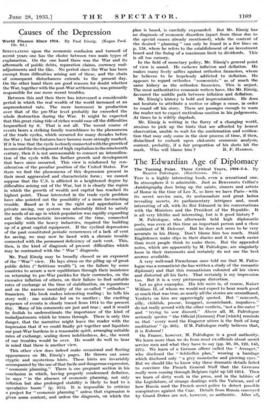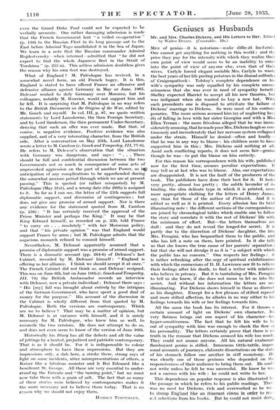The Edwardian Age of Diplomacy
Tars is a highly interesting book, even a sensational one. In atmosphere it is admirable. Just as Benvenuto Cellini's Autobiography does bring up the saints, sinners and artists of Rome in the time of Leo X, so here we have Paris—with its secret service men, its ambassadors and great ladies revealing secrets, its parliamentary intrigues and, most interesting of all, with its Roi Edouard in his conversations with the Ministers and the President of the Republic. It is all very lifelike and interesting, but is it good history ?
M. Paleologue, who afterwards held high diplomatic posts, was even at this time an important person and a close confidant of M. Delcasse. But he does not seem to be very accurate in his Diary. Don't blame him too much. Staid Englishmen make slips in their diaries and it is much easier than most people think to make them. But the appended notes, which are apparently by M. Paleologue, are singularly loose in their statements and certainly do not use the best sources available.
A very well-read Frenchman once told me that M. Paleo- logue was a romanticist (he has written a study of the romantic diplomat) and that this romanticism coloured all his views and distorted all his facts. That certainly is my impression too. But it is a very picturesque distortion.
Let us give examples. His bete noire is, of course, Kaiser William II, of whom we would not expect to hear much good or much that was true, as nearly all the stories are secondhand. Verdicts on him are approvingly quoted. But " coxcomb, silly, childish, poseur, braggart, mountebank, impulsive," do not really accord with the other verdicts, "not a fire-eater" and " trying to sow discord." Above all, M. Paleologue seriously quotes " the Official [German] Post [which] reminds us that ' every word the Emperor utters is the fruit of long meditation' " (p. 305). If M. Paleologue really believes that, it is Kolossal I On France, however, M. Paleologue is a good authority. We learn more than we do from most ex-officials about secret service men and what they have to say (pp. 30, 38, 123, 143, 221). We learn of a German officer called the " Avenger," who disclosed the " Schlieffen plan," wearing a bandage which disclosed only " a grey moustache and piercing eyes." But we should like to know why these dramatic details failed to convince the French General Staff that the Germans really were coming through Belgium right up till 1914. Then we learn of dirty work in the press, and in the lobbies of the Legislature, of strange dealings with the Vatican, and of how Russia used the French secret police to detect possible conspirators against the Czar. Details from Russia conveyed by Grand Dukes are not, however, so authentic. After all, even the Grand Duke Paul could not be expected to be verbally accurate. One rather damaging admission is made
that the French Government lent a veiled co-operation " (p. 110) to the Russian Fleet in its long passage out to the East before Admiral Togo annihilated it in the Sea of Japan.
We learn in a note that the Russian commander Admiral Rojdestvensky—when interned—admitted that " he did not expect to find the whole Japanese fleet in the Strait of Tsushima " (p. 255 n). This artless admission doubtless gives the reason why his own fleet was destroyed.
What of England? M. Paleologue has revived, in a somewhat novel form, an old French bogey. It is this.
England is stated to have offered France an offensive and defensive alliance against Germany in May or June, 1905. Delcasse wished to defy Germany over Morocco, but his colleagues, notably M. Bouvier, would not support him and he fell. It is surprising that M. Paleologue in no way refers
to the British Documents on the Origins of the War, edited by Mr. Gooch and myself. In vol. III, p. 87, we quote written
statements by Lord Lansdowne, the then Foreign Secretary, and by Lord Sanderson, the then permanent Under-Secretary, denying that such an offer was ever made. But that, of course, is negative evidence. Positive evidence was also supplied, and of a very interesting character, from the British side. After a conversation on May 25th, Lord Lansdowne
wrote a letter to M. Cambon (v. Gooch and Temperley, Ill, 77-8). He refers to M. DelcaEse's observation that the situation
with Germany was dangerous, and says : " . . There should be full and confidential discussion between the two Governments not so much in consequence of some acts of unprovoked aggression on the part of another Power, as ige anticipation of any complications to be apprehended during the somewhat anxious period through which we are at present passing." This is quoted (or rather misquoted) by M.
Paleologue (May 31st), and a wrong date (the 29th) is assigned to it. So far as I can see, the letter of the 25th suggests full
diplomatic support, and discussion of contingencies ; but
does not give any promise of armed support. Nor is there any evidence for the statement quoted from M. Cambon (p. 258) : " It has certainly received the approval of the Prime Minister and perhaps the King." It may be that King Edward himself, as recorded on p. 250, told France " to carry on . . . resolutely " with her Moroccan policy, and that " his private opinion " was that England would support France by arms ; but M. Paleologue admits that the sagacious monarch refused to commit himself.
Nevertheless, M. Delcasse apparently assumed that a promise of diplomatic support was a promise of armed support.
There is a dramatic account (pp. 2646) of Delcasse's last Cabinet, recorded by M. Delcasse himself : " England is offering us her alliance. I think we should accept it at once."
The French Cabinet did not think so, and Delcasi0 resigned.
This was on June 6th, but on June 10th (v. Gooch and Temperley, III, 78) the British Ambassador records an interview
with Delcasse, now a private individual ; Delcasse there says :
" His [myl fall was brought about entirely by the intrigues of the German Government, who have spent a good deal of
money for the purpose." His account of the discussion in the Cabinet is wholly different from that quoted by M. Paleologue. Both the versions are contemporary. Which are we to believe ? That may be a matter of opinion, but M. Delcasse is at variance with himself, and it is surely necessary for M. Paleologue, who knew him so well, to reconcile the two versions. He does not attempt to do so, and does not even seem to know of the version of June 10th.
Historically his Diary has all the defects and all the value of jottings by a heated, prejudiced and patriotic contemporary. That is as it should be. For it is indispensable to colour and atmosphere to have these impressions. But they are impressions only, a dab here, a stroke there, strong rays of light on some incidents, utter misrepresentations of others, a Kaiser like a fabulous monster and le Roi Edouard like a beneficent St. George. All these are very essential to under- titand.rig the Entente and " the turning point," but we must now take them with a grain of salt. The fact that so many of these stories 'were believed by contemporaries makes it the more necessary not to believe them today. That is no reason why we should not enjoy them.
HAROLD TEMPERLEY.







































 Previous page
Previous page